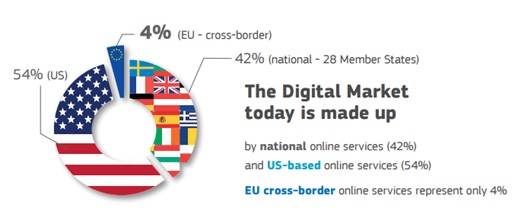The 28 member states of the European Union each have different rules governing electronic commerce. This creates a huge headwind that opposes the growth of the digital economy in Europe. Europe’s leaders recognize the importance of addressing this threat to economic competitiveness and working towards developing a Digital Single Market (DSM). Recently European Commission Vice President Andrus Ansip spoke at a Brookings Institution event. His speech reveals that both America and Europe have a great deal to gain from the DSM.
The digital market in Europe

Source: The European Commission
Free data flows
Different countries have different policies that regulate data. Strict regulations or policies that deviate from the norm can unnaturally restrict how data flows across borders. Harmonizing regulatory regimes allows more businesses to operate in more markets, which can aid producers and consumers. It is in this way that both Americans and Europeans stand to benefit from the creation of DSM.
National security considerations can also play a role in restricting data flows. Europeans have expressed concern that American intelligence agencies have overused national security exceptions. Developing a system of digital trade that is transparent and protects privacy for all parties will also serve as an economic boon. Such an agreement could assuage some of the mistrust that spread in the wake of the Snowden disclosures.
Global technical standards
Vice President Ansip also discussed the value of global technical standards. He raised the example of electronic prescriptions, which are widely used in Sweden. However, a Swedish person traveling to Estonia for example would likely not be able to have that prescription filled. An agreement on prescription standards could go a long way towards promoting trade within the European Union, but also abroad.
Fewer restrictions on digital trade are a winning policy for all parties. This is likely why U.S. tech giants like Facebook and Google have voiced support for the DSM. According to a European Commission infographic, “If the same rules for e-commerce were applied in all EU Member States, 57 percent of companies would either start or increase their online sales to other EU countries.” It’s stands to reason that harmonized rules on electronic commerce will also encourage trans-Atlantic digital trade.<
/p>
Commentary
The benefits of a Digital Single Market in Europe and the United States
June 17, 2015